CX Agents and AI What to Expect in the Coming Years
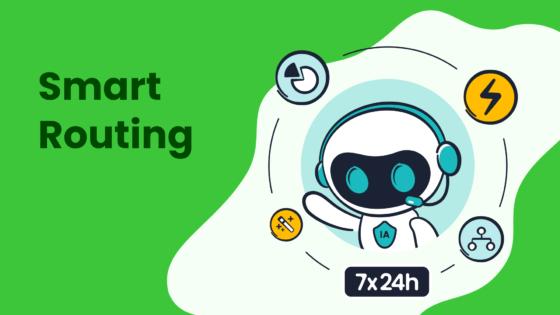
CX agents and businesses enter a transformational era for cx, driven by rapid AI adoption and shifting customer expectations. Recent surveys show 59% of organizations use AI to enhance customer-facing operations, with Sobot AI and Sobot call center solutions leading the way in unified, efficient customer experience.
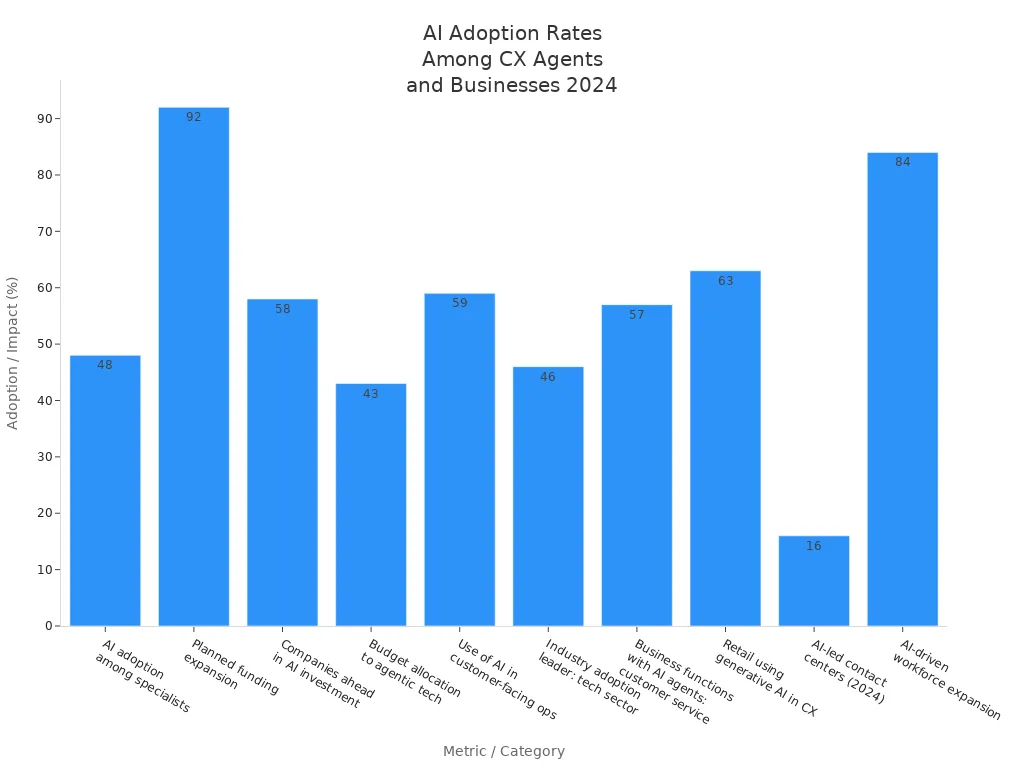
CX professionals face strong urgency to adapt, balancing automation with empathy. Sobot empowers teams to deliver seamless, personalized customer service in this evolving landscape.
CX Agents and AI
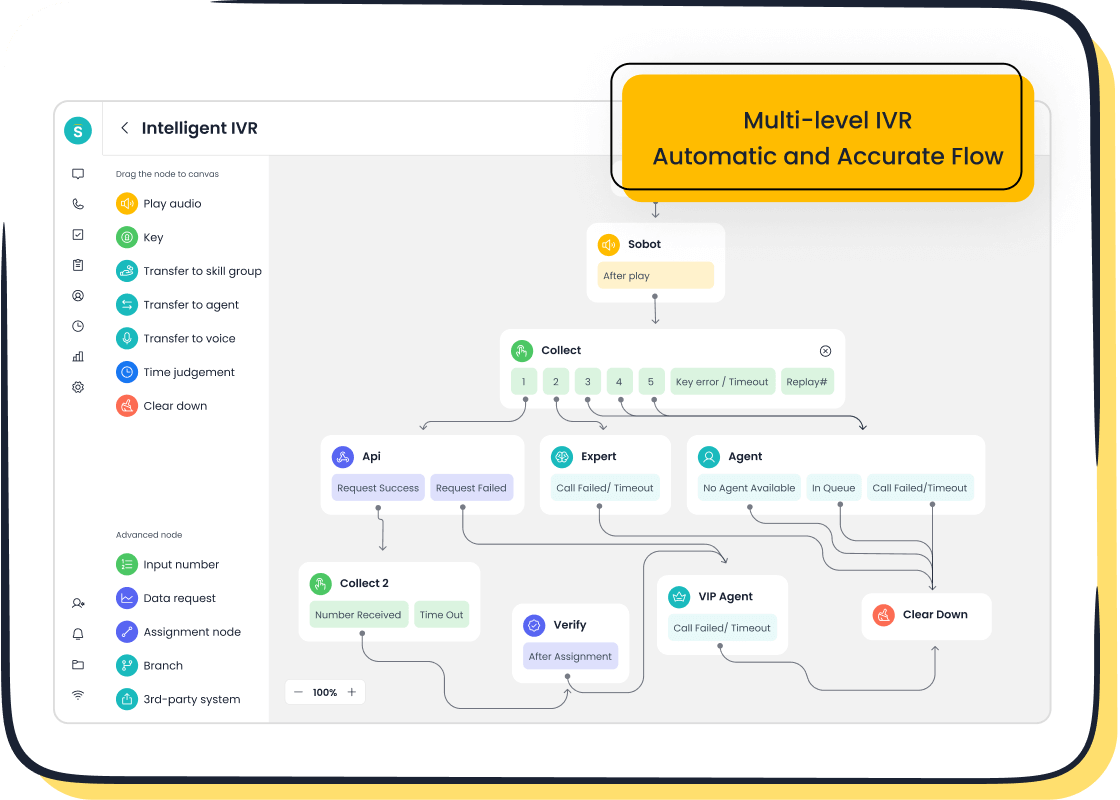
Evolving Roles
AI is changing the landscape for cx agents. In the past, customer service teams spent much of their time on repetitive tasks like answering basic questions or updating account information. Now, ai agents handle many of these routine interactions. This shift allows cx agents to focus on complex, high-value conversations that require empathy, problem-solving, and deep product knowledge.
- AI enables cx agents to move from task-based roles to advisory positions. They now act as collaborators and consultants, helping customers with nuanced needs.
- AI and machine learning systems analyze customer data in real time. These systems adjust tone, cadence, and content based on customer mood or urgency, creating a more conversational and personalized experience.
- Automation reduces the cognitive load on cx agents. With ai-driven tools managing simple requests, agents can dedicate more energy to emotionally charged or high-stakes issues.
Recent research highlights several key changes:
- AI shifts cx agents from routine tasks to handling complex, emotional, or high-value interactions.
- AI agents now resolve many customer needs independently, increasing the volume of conversations and requiring seamless collaboration between humans and ai.
- Upskilling and simulation-led onboarding reduce time-to-proficiency by up to 30%, building agent confidence in working with ai.
- Integration with systems like CRM and billing empowers ai agents to act, not just converse, improving productivity and reducing call wrap times.
- Metrics such as autonomous case resolution rates and customer satisfaction deltas measure the impact of ai on cx agent performance.
Note: As ai takes over routine work, cx agents become more valuable as advisors and problem-solvers. This evolution supports both customer service demands and agent job satisfaction.
Human-AI Collaboration
The rise of conversational ai has created a blended workforce. Human agents and ai agents now work side by side to meet growing customer service demands. This collaboration brings both opportunities and challenges.
- Automation improves efficiency by handling routine inquiries and reducing repetitive workloads. This allows cx agents to focus on complex, high-touch tasks.
- AI-powered personalization delivers tailored customer experiences. Conversational ai adjusts responses based on customer history and preferences, something human agents alone cannot do at scale.
- Studies show that while ai handles routine support, customers still prefer human agents for emotionally charged or high-stakes issues. This division of labor ensures that each interaction receives the right level of attention.
However, the shift to more complex interactions increases stress for cx agents. According to ICMI’s The State of Experience in 2023 survey, 58% of agents feel stressed at least half the time (ICMI). Omdia’s 2025 Digital CX Survey reports that 75% of North American contact center leaders worry about the impact of complex cases on agent well-being. To address this, organizations implement real-time ai support, wellness programs, and adaptive scheduling.
- Real-time ai support provides agents with instant information and suggested responses during live conversations.
- Enhanced training and simulation-led onboarding help agents build confidence in working with ai.
- Adaptive scheduling and wellness programs reduce burnout and improve job satisfaction.
Tip: A successful customer service strategy blends the strengths of both human and ai agents. This approach meets customer expectations for fast, accurate, and empathetic support.
Sobot Solutions
Sobot’s Voice/Call Center and Omnichannel Solution stand out as leading examples of ai-driven tools that empower cx agents and transform customer service operations.
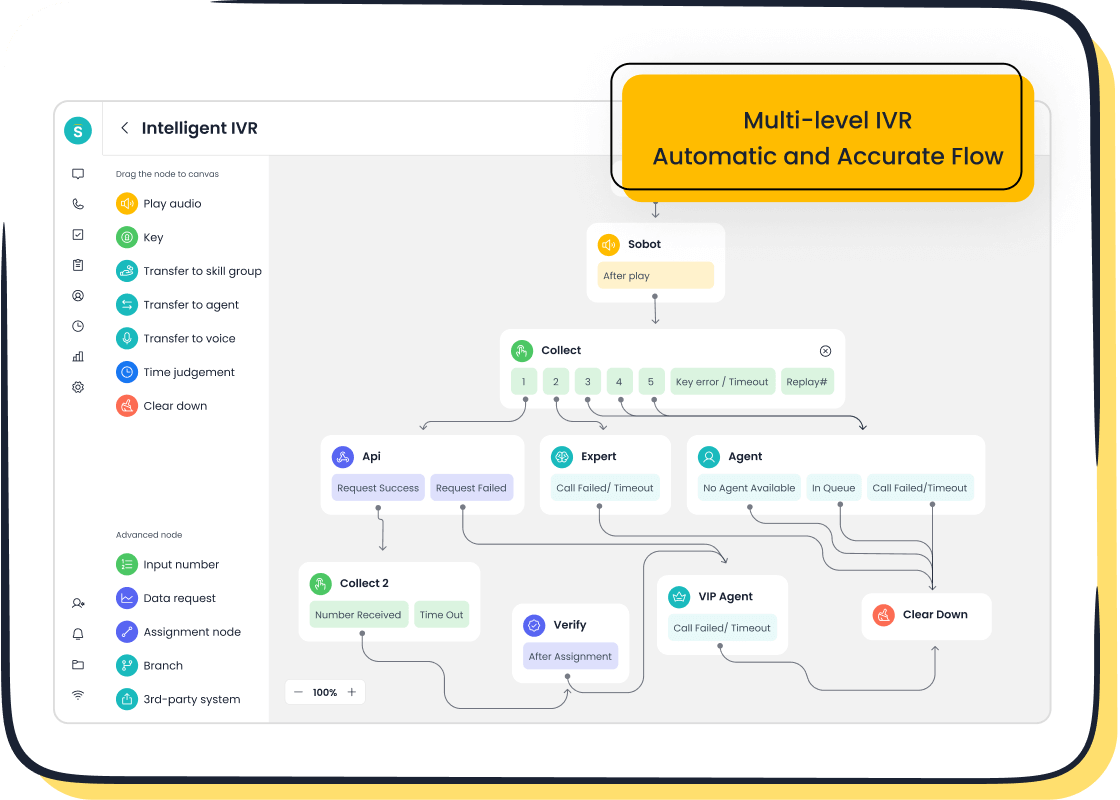
The Sobot Voice/Call Center uses conversational ai to automate inbound and outbound calls. Features like intelligent IVR, smart call routing, and ai-powered voicebots ensure that customers receive fast, accurate responses. The unified workspace gives cx agents access to all customer information in one place, streamlining workflows and reducing average handle time.
Sobot’s Omnichannel Solution integrates multiple communication channels—voice, chat, email, and social media—into a single platform. AI-driven chatbots provide 24/7 self-service, handling routine queries and freeing cx agents to focus on complex issues. The platform’s analytics tools offer real-time insights, helping managers optimize team performance and improve customer satisfaction.
| Metric | Sobot’s AI-Powered CX Solutions Impact | Comparison to Traditional CX Technologies |
|---|---|---|
| Customer Interaction Handling | AI expected to handle 95% of interactions by 2025 | Traditional methods handle fewer, less personalized interactions |
| Productivity Gains | Up to 400% increase | Significantly lower productivity improvements |
| Time Saved | Up to 2.5 billion hours saved annually | No comparable automation impact |
| Customer Retention Increase | Up to 25% increase | Lower retention improvements |
| Revenue Increase | Up to 15% increase | Less impact on revenue growth |
| Customer Satisfaction | Up to 25% increase via proactive service | Lower satisfaction gains |
| Churn Rate Reduction | Up to 30% reduction | Less effective churn reduction |
| Retention Rate Improvement | Up to 20% improvement | Lower retention improvements |
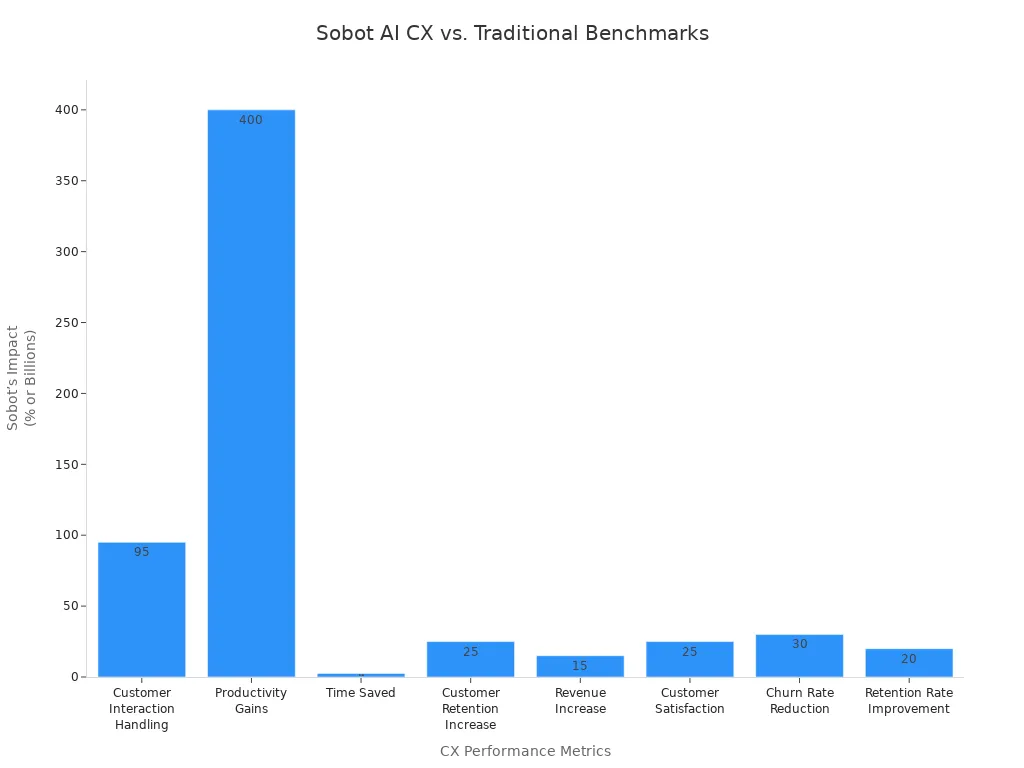
Sobot’s solutions deliver measurable results:
- AI-powered customer service tools provide continuous 24/7 support and automate repetitive tasks, resulting in up to 400% productivity gains and saving billions of hours annually.
- AI implementation leads to 52% faster ticket resolution and a 30% reduction in customer service costs.
- 73% of shoppers perceive ai as improving their overall customer experience.
- Advances in conversational ai technology enable near-human conversational abilities, including understanding context, managing interruptions, and detecting emotional cues.
Sobot’s Voice/Call Center and Omnichannel Solution help organizations:
- Meet rising customer service demands with scalable, automated customer engagement.
- Enable self-service options for customers, improving satisfaction and reducing agent workload.
- Support cx agents with real-time data, ai-driven insights, and seamless integration with existing systems.
Sobot’s commitment to innovation and customer-centricity ensures that cx agents have the tools they need to thrive in an ai-driven future. By leveraging conversational ai and automated customer engagement, businesses can deliver exceptional customer experiences while empowering their teams.
Customer Experience Trends 2025
Hyper-Personalization
Customer experience trends in 2025 show a clear shift toward hyper-personalization. Companies now use advanced AI to create personalized customer journeys that feel unique to each individual. This approach goes beyond using a customer’s name in an email. Brands analyze behavior, purchase history, and engagement patterns to anticipate needs and deliver relevant recommendations.
- 72% of customers engage only with marketing messages tailored to their interests.
- 70% of consumers are willing to pay more for personalized products and services.
- 85% expect a seamless experience across online and offline channels.
- 59% believe businesses should personalize experiences based on collected data.
AI-powered personalization increases conversion rates by 20-30% and improves customer satisfaction by 15-20%. Companies using customer data for personalization see on average 40% more revenue. Real-time personalization, powered by large language models and generative AI, enables brands to respond instantly to customer actions. This technology transforms simple transactions into conversational, human-like interactions.
Companies that invest in real-time personalization and predictive analytics can anticipate customer needs before they arise. This proactive approach leads to higher engagement and loyalty.
By 2025, 90% of businesses will rely on unified data platforms to deliver digital customer experiences. Hyper-personalized experiences drive repeat engagement and long-term loyalty. However, companies must balance personalization with privacy, ensuring transparent data use and compliance with regulations.
Customers expect brands to recognize them and provide relevant offers at every stage of the customer journey. When personalization is lacking, 76% of consumers feel frustrated. Data-driven personalization not only increases satisfaction but also builds trust and encourages active customer engagement.
Omnichannel Engagement
Omnichannel engagement stands out as one of the most important customer experience trends for 2025. Customers interact with brands across multiple channels, including social media, email, chat, and phone. They expect a seamless transition between these channels, with no loss of context or information.
- Companies with strong omnichannel strategies retain up to 89% of their customers, compared to 33% for weak strategies.
- Customers engaging on three or more channels have a 30% higher lifetime value than single-channel customers.
- Omnichannel buyers spend 1.5 times more monthly than single-channel buyers.
- Brands with strong omnichannel engagement see a 9.5% annual revenue increase, versus 3.4% for weaker strategies.
Omnichannel engagement evolves from disconnected channels to integrated, customer-centric experiences. Data integration plays a key role. Companies combine structured and unstructured data from various sources to create a unified view of the customer. This unified view enables organizations to understand customer behavior across all touchpoints and deliver consistent, personalized experiences.
Seamless integration across channels fosters stronger customer relationships and drives revenue growth.
AI-driven insights help companies measure customer interactions in real time. This allows for continuous improvement of customer journeys and more effective active customer engagement. Omnichannel strategies also improve employee efficiency by providing a clearer picture of customer journeys and reducing time spent searching for information.
Customers expect brands to recognize their preferences and provide consistent service, whether online or offline. Companies that deliver on this expectation build trust, increase satisfaction, and encourage repeat business.
Sobot in Action
Sobot leads the way in delivering the latest customer experience trends through its AI-powered solutions. The company’s omnichannel platform and Voice/Call Center help businesses create hyper-personalized experiences and seamless omnichannel engagement.
A standout example comes from Agilent, a global leader in life sciences and diagnostics. Agilent faced challenges managing a high volume of customer inquiries while maintaining accuracy and efficiency. By implementing Sobot’s omnichannel workbench and AI-powered chatbot, Agilent transformed its customer service operations.
- Sobot’s AI-powered chatbot provided 24/7 support, handling routine inquiries and freeing human agents to focus on complex issues.
- The omnichannel solution unified customer interactions across the website and social media, reducing the need for agents to switch between platforms.
- Intelligent routing directed customers to the right skill group, improving problem resolution rates.
As a result, Agilent saw a sixfold increase in customer service efficiency, a 25% reduction in costs, and a customer satisfaction score of 95%. The AI-driven insights from Sobot’s platform enabled Agilent to monitor performance in real time and make data-driven decisions.
| Measurable Impact | Description |
|---|---|
| Up to 30% reduction in churn | AI-based retention tools analyze real-time data to reduce customer churn significantly. |
| Up to 20% higher retention rates | Personalization and anticipation of customer needs through AI lead to improved retention. |
| 25% increase in satisfaction | Companies using AI in customer engagement report notable improvements in satisfaction scores. |
| Example: SaaS churn detection | AI flags inactive users early, enabling personalized outreach to prevent churn. |
| Example: E-commerce chatbot | Sentiment analysis triggers live agent intervention, improving support and loyalty. |
Sobot’s solutions help businesses deliver hyper-personalized experiences and active customer engagement at scale. The platform’s real-time personalization and AI-driven insights enable companies to anticipate customer needs, reduce churn, and increase satisfaction. Sobot’s unified workspace and analytics tools provide a complete view of the customer journey, supporting continuous improvement and innovation.
Sobot’s commitment to innovation and customer-centricity ensures that businesses stay ahead of 2025 cx trends. By leveraging AI, real-time personalization, and omnichannel engagement, organizations can deliver exceptional customer experiences and build lasting relationships.
Human Touch in Customer Experience

Empathy and Complex Issues
Empathy remains a cornerstone of effective customer experience. While AI handles routine tasks, human agents step in for complex or emotionally charged situations. Research shows that 72% of consumers accept AI interactions if they can escalate to a human, and 86% value human connection more than speed. For urgent or complicated issues, 74% of customers prefer speaking with a person. AI tools, such as sentiment analysis and emotion detection, alert agents when a conversation needs a personal touch. This synergy allows AI to manage simple requests while agents focus on building relationships and solving unique problems.
- Companies using emotional AI report a 30% increase in customer loyalty.
- Emotion-driven strategies lead to a 30% improvement in satisfaction.
- AI frees up to 30% of agents’ time, letting them focus on critical thinking and empathy.
Human empathy interprets the “why” behind customer emotions, providing context and understanding that AI cannot fully replicate.
Building Trust
Trust forms the foundation of every successful customer relationship. Human-led interactions build trust through authenticity, empathy, and even imperfection. Studies reveal that 54% of consumers prefer human assistance for purchases, and 41% feel more comfortable sharing personal details with a person than with AI. While AI-powered engagement offers consistency and speed, it sometimes lacks the emotional connection needed for trust. Brands that blend AI efficiency with human empathy see higher satisfaction and loyalty. For example, companies using emotional AI experience 25% higher retention and 15% more customer acquisition.
- Human agency and emotional connection remain essential for trust.
- 55% of consumers lack confidence in AI purchase recommendations.
A balanced approach, where AI supports agents but does not replace them, leads to stronger customer relationships.
Sobot’s Approach
Sobot recognizes the importance of empathy and trust in customer experience. Its omnichannel solution uses AI to automate routine tasks, allowing agents to focus on complex issues that require a human touch. Real-time sentiment analysis and emotion detection help agents respond with empathy during challenging conversations. Sobot’s unified workspace gives agents access to customer history and preferences, supporting personalized engagement. This approach ensures that every customer feels heard and valued.
Sobot’s solutions empower agents to deliver empathetic service while maintaining efficiency. By combining AI-driven insights with human understanding, Sobot helps businesses build lasting trust and loyalty.
New CX Agent Skills and Workplace Trends
Essential Skills
The role of cx agents continues to evolve as customer service becomes more digital and data-driven. Upskilling and reskilling have become critical for professionals to stay competitive. Industry reports highlight several in-demand skills for 2025:
- AI automation and data literacy help agents use advanced tools and analyze customer data.
- Critical thinking and problem-solving enable agents to resolve complex issues quickly.
- Emotional intelligence and behavioral science knowledge improve customer interactions.
- Ethical AI and data privacy expertise ensure trust and compliance.
A recent Gartner survey found that 85% of business leaders expect a surge in skills development needs due to AI and digital trends. Companies now map current roles to emerging competencies and use AI-driven analytics to predict skill gaps. The table below shows key skill areas and their impact:
| Skill Area | Description | Example Case Study | Reported Impact/Statistic |
|---|---|---|---|
| AI and Automation Specialists | Manage AI-driven CX tools and chatbots | Bank of America’s Erica | 30% cost reduction, 40% faster response (Deloitte) |
| CX Data Analysts | Analyze customer data for personalization | Spotify | 35% higher satisfaction, 25% revenue growth |
| CX Designers with Digital Skills | Design seamless digital experiences | Microsoft | 30% more engagement, 20% loyalty boost |
Training and Flexibility
Training programs for customer service agents now use AI-augmented coaching systems. These platforms analyze conversations in real time and offer instant suggestions to improve sentiment and personalization. Unlike traditional training, AI coaching provides continuous, personalized feedback. This approach reduces performance gaps and helps agents adapt to new technologies.
Workplace flexibility has also become a top priority. Many agents value schedule flexibility over pay or time-off benefits. Options like self-managed scheduling, shift variations, and flexible breaks improve work-life balance and job satisfaction. Contact centers that support remote and hybrid work models see higher engagement and lower attrition. Personalized coaching and flexible arrangements lead to better performance and more meaningful customer service.
Agents who feel empowered by flexible schedules and ongoing learning opportunities deliver better customer experiences and stay longer in their roles.
Sobot Support
Sobot supports cx agents by providing AI-powered tools such as AI Agent, AI Copilot, and AI Insight. These solutions automate repetitive tasks and allow agents to focus on impactful work. AI Copilot recognizes customer intent and sentiment, generates responses, and summarizes conversations, helping agents work efficiently. AI Insight delivers analytics to monitor and optimize performance. Sobot’s voicebot technology handles self-service requests, reducing agent workload and enabling agents to address more complex customer needs. Continuous integration of the latest language models and ongoing training ensures agents stay ahead of workplace trends and customer expectations.
Predictions for CX Agents
Future Challenges
Industry predictions show that cx agents will face new challenges as technology advances. Customers will expect instant solutions and highly personalized service. Many will become less patient and more demanding, making each interaction more complex. As ai agents handle simple requests, cx agents will focus on complicated cases that require empathy and problem-solving. They must also maintain strong personal connections, even as automation increases.
Key challenges include:
- Meeting higher expectations for fast, personalized support.
- Handling more difficult conversations as customer patience drops.
- Overseeing ai performance and ensuring smooth collaboration between humans and machines.
- Adapting to rapid changes in technology and integrating secure, scalable ai tools.
- Managing multi-channel conversations across voice, chat, email, and social media.
Note: The role of cx agents will become more important as they help build brand loyalty and trust in a world where ai is everywhere.
Opportunities Ahead
Predictions also highlight many new opportunities for cx agents. Ai will provide real-time guidance, helping agents deliver faster and more accurate support. Generative ai can automate routine tasks like call transcription, freeing agents to focus on building relationships. With ai surfacing insights from customer data, agents can offer proactive, hyper-personalized service.
Some emerging opportunities:
- Moving into higher-value roles such as supervisors or coaches who oversee ai systems.
- Using omnichannel ai tools to keep context across all customer touchpoints.
- Leveraging ai-driven security and compliance tools to protect customer data.
- Becoming specialists who combine empathy with advanced technology to deliver exceptional experiences.
A recent study found that ai-assisted agents handle 14% more chats per hour, and generative ai boosts issue resolution by 15% (Salesforce Research).
Sobot’s Vision
Sobot’s vision aligns with these predictions for the future of cx agents. The company leads with an ai-first strategy, integrating advanced technologies to boost agent efficiency and customer satisfaction. Sobot’s platform combines omnichannel ai, scenario-based ai, and secure, privacy-focused solutions. Features like AI Copilot and AI Insight support human-AI collaboration, reducing agent workload by up to 60% and improving Net Promoter Scores by 35%. Sobot’s no-code tools and flexible integration make it easy for businesses to adapt quickly. This approach ensures cx agents can focus on what matters most—delivering personalized, empathetic service while ai handles the rest.
CX agents will see rapid changes in customer experience as AI and analytics drive new trends.
- Brands now focus on systemic improvements and real-time employee empowerment.
- Sobot’s AI Chatbot and Voicebot deliver 24/7 support, resolve over 62% of issues, and boost efficiency sixfold.
- Upskilling agents leads to a 13% rise in customer satisfaction and doubles retention rates.
| Action Step | Benefit |
|---|---|
| Embrace AI tools | Faster, smarter customer experience |
| Invest in upskilling | Higher satisfaction and agent retention |
| Maintain human-centricity | Builds trust and lasting relationships |
Explore Sobot’s solutions or share your own customer experience journey to stay ahead of future trends.
FAQ
What are the main benefits of AI for CX agents?
AI helps CX agents by automating routine tasks, reducing response times, and improving accuracy. Sobot’s AI-powered solutions increase productivity by up to 400% and enable agents to focus on complex customer needs. This leads to higher satisfaction and lower operational costs.
How does Sobot support omnichannel engagement for CX agents?
Sobot’s Omnichannel Solution unifies voice, chat, email, and social media in one workspace. CX agents can manage all customer interactions efficiently. Real-time AI insights help agents deliver consistent service across every channel, improving customer loyalty and retention.
Can AI-powered tools replace human CX agents?
AI handles repetitive and simple tasks, but human CX agents remain essential for empathy and complex problem-solving. Sobot’s AI supports agents by providing real-time suggestions and automating workflows, allowing agents to focus on building trust and resolving unique issues.
What skills do CX agents need in an AI-driven environment?
CX agents need data literacy, critical thinking, and emotional intelligence. They must understand how to use AI tools like Sobot’s AI Copilot and AI Insight. Training in digital communication and ethical AI practices also helps agents adapt to new workplace trends.
How does Sobot ensure data security for CX agents and customers?
Sobot uses encrypted data transfer and secure system integration. The platform maintains 99.99% uptime and complies with global data privacy standards. CX agents and customers benefit from reliable, secure communication across all channels.
For more details, visit Sobot’s official website.
See Also
Best Artificial Intelligence Tools For Enterprise Contact Centers
An In-Depth Review Of AI Solutions For Call Centers
Comprehensive Guide To AI Software For Call Centers
